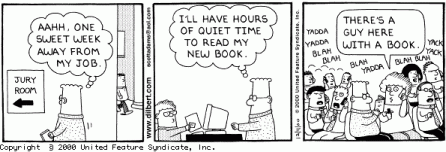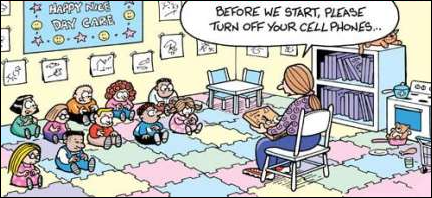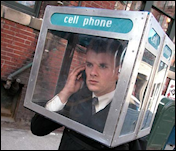




A Single View of Marriage |
Biblical Sexuality |
'Christian' Books |
Missionary Kids |
Pet Peeves
Pornography: Confession, Healing, and Contention |
Respecting Women |
Single Notes
Snippets |
Spiritual Forces |
Tension Points |
'Wild at Heart'?
| Pet Peeves (View in PDF) |
Mobile phones/texting | Smokers | Leeches | Body language? | Mood matchers
Downright rude and lazy | Patronizers | Unsolicited 'advice'
I'm certainly not perfect (understatement of the year), but if you're honest with yourself, you'll have to admit that there are things that frequently bother or annoy you. Having been asked on more than one occasion what "torques my cork," and knowing that blogs are frequently used to vent frustration, I thought I would jot some of mine down:
 |
 |
 |
 |
 |
First and foremost, I want to stress that like any tool, use or misuse of mobile phones all boils down to individual responsibility. However, because of their highly portable and visible nature, mobile phones have introduced a number of problems beyond the phone booth, including potential health concerns. While mobile phones themselves are not inherently bad, the odds are good that their owners may well be—let me explain.
When digital watches became affordably popular in the 1980s, they were a nuisance because people set the (then) 'amazing, new' hourly chime to "on", creating annoying digital chirps every hour anywhere you went. Though you rarely hear the hourly "chirp" anymore, mobile phones have picked up where it left off. If, as a person, you are not responsible, your mobile phone will make others aware of that in no uncertain terms. For example, someone answering their phone while (and yes, I've personally encountered all of these):
Why do I despise mobile phones? They perpetuate the rude and irresponsible behavior of their owners. Some of my reasons include:
Can they be helpful? Of course—after all, they have saved lives. However, it would be interesting to compare statistics on how many lives they have saved versus how many deaths they have caused, because like guns and alcohol, they can—and do—take innocent lives in the hands of irresponsible people.
Are they helpful? Sure, but only when used by someone who:
Few people will dispute that when used responsibly, mobile phones are capable of saving time, money, and again—lives. However, irresponsible use disrupts, distracts, and annoys. Jackie Chan's phone, for example, went off while he was filming a movie. From my experience, the majority of mobile phone owners neither use them responsibly, nor show any desire to. Until that changes, mobile phones will remain both a real nuisance and a potential danger.
Texting (and sexting) is even more dangerous, as it typically requires both hands and eyes in order to compose and send a phrase or sentence. Seeing someone pass you in the opposite lane 'driving' with their arms/elbows (not their hands!) on the steering wheel while they're looking down at their phone texting with both hands is a very sobering and chilling experience. Accidents and death from texting while driving is an ongoing problem.
I challenge the notion that texting (a.k.a. "lazy English") does not affect English skills (let alone improve them), as has been suggested by an Australian high school student (PDF). Seeing that his own post contains several spelling and grammatical mistakes, he does at least correctly note that either schools are no longer teaching English writing skills as they should, or students themselves aren't paying attention.
To be fair, the adages "practice makes perfect" and "use it or lose it" reinforce what we should all be aware of with technology: that its extended reach and increased use comes with a big price tag. Our handwriting, English skills, and even basic math skills suffer the greater our addiction and reliant we become.
Most importantly, by texting (and other forms of electronic communication) we are increasingly allowing the erosion of our ability to relate and interact with each other.
Also known as "dragons" or "volcanoes." In short, people who are intent on dying an early death, and taking others with them. It is a medical fact that second-hand smoke is significantly more deadly than what smokers themselves inhale through their cigarette's filter. They also create a choking stench, leave messes others usually have to clean up, ruin the experience of food, threatening others—and their own—health. There's a reason it's known as a "cancer stick."
Not to be confused with Lychees (a tasty, juicy fruit), these are people who call you a "friend," but use you like a handout. They have no qualms in taking advantage of you and asking for personal favors even when they've made no attempt to compensate you or prove their request(s) are actually reasonable in the first place. They are notorious for showing little—if any—gratitude for the favor or help they've received.
How do you spot a leech? If someone:

Cousins to the leeches, these are people who typically dominate conversations or go out of their way to engage in nothing more than small talk—having no idea (or just not caring) how disruptive and annoying they are to others. Similar in fashion to the leeches, they often feed on the kind and gracious natures of others and seem to insist on testing the limits of their patience. They neither know, nor practice, manners or consideration of others.
It would seem they either have no work to do, or are just 'taking a break.' If you have encountered these people, you've noticed that they:
Some of these people show additional traits such as: being nosy, inconsiderate, insensitive, tactless, pushy, or needlessly confrontational. Some will create problems and make others look bad through their complete lack of planning or timing: i.e. "Lack of planning on your part does not constitute an emergency on my part." Sadly, being gracious toward these people is like trying to pet a porcupine.
Blood brothers to those who cannot read body language (or simply don't bother), these are people who are convinced that everyone around them should feel exactly as they do, and take it as a personal insult if you don't. They feel it is their responsibility to make you feel the same way. If they're a morning person, you should be too. It's interesting that Proverbs 27:14 actually talks about this:
"He who blesses his friend with a loud voice early in the morning, it will be reckoned a curse to him."
Now, I'm not referring to people who are simply polite in greeting you or who are happy themselves—there's certainly nothing wrong with that, but rather those who seemingly go out of their way (read: border on being obnoxious) to try and make you match their mood.
These are people who:
These are people—typically waitresses, but can be anyone—who for some obscure reason address you via falsely endearing terms such as "Sweetie," "Honey/Hon," or "Darling." Now, I understand that they probably do it without thinking and don't mean anything by it, but that doesn't make it any less awkward, nor does it become any more acceptable—it's simply not respectful nor appropriate for a restaurant setting. I am an adult customer that they have no relationship with. That language should be reserved for their husband or 2-year-old child—if not, what do they call them? It's also a double-standard. How many male waiters do you know who call their female customers "Sweetie?" If I called them "Sweetie" or "Hon,", at best I would probably be given a cold stare, but could potentially be sued for sexual harassment, or (if present) maybe even given a black eye by their boyfriend or husband. I respectfully call them "Ma'am," so they can respectfully call me "Sir." If you want a tip, give me a reason to leave one.
Has it ever bothered you when someone gave some 'helpful' advice or suggestions without your asking for it? Having been the recipient of this in the past, I trust I'm learning to never do it to someone else. Telling someone "You need to..." and "I think you should..." are two of the fastest ways to insert distance between any friendship, especially when speculation and a judging spirit are the only things the 'advice' is based on. A lack of genuine compassion and understanding doesn't help, either.
| Comments? |